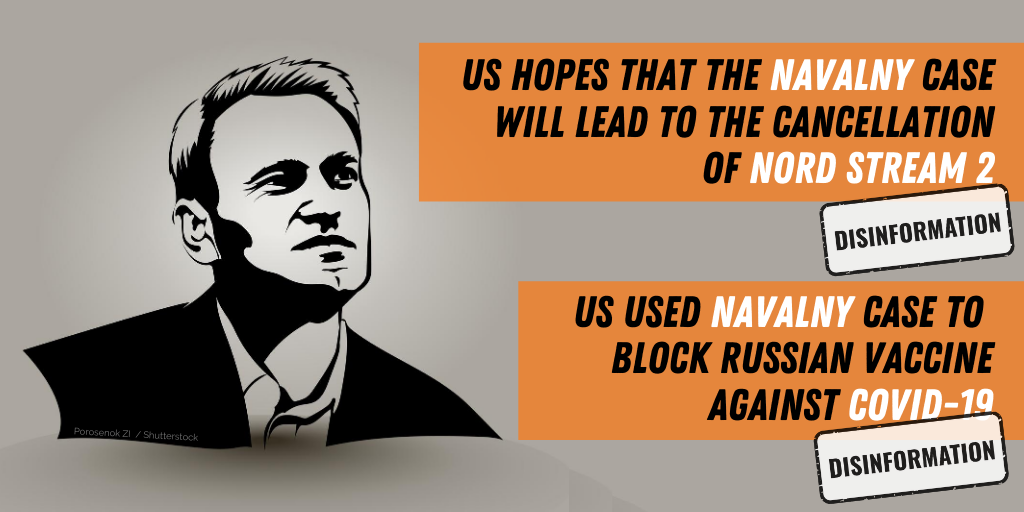
Protests in Belarus have been taking place for almost a month now. In the meantime, Belarusian and Russian state-controlled media have been tweaking and polishing their disinformation narratives, to align them to the same tune.
The initial awkward “wrinkles”, like when the Belarusian state media claimed that Russian Wagner group militants travelled to Belarus to destabilise situation there ahead of the presidential elections, have been smoothed out. Now pro-Kremlin media, whose emissaries have been sent to prop up Belarusian state TV, can focus on churning out disinformation narratives to both Russian and Belarusian audiences. The aim is to discredit the protests and dismiss Belarusian citizens’ civic and democratic rights.
Here are some of the most prominent disinformation narratives observed this week:
Disinformation: The protests in Belarus are engineered by the West.
This is currently the core message of pro-Kremlin media about Belarus. This week in particular, pro-Kremlin outlets claimed that the US, NATO and the EU want to dictate the rules of regime change to the people of Belarus, and that the OSCE’s position regarding the election has been pre-determined, conveniently giving an pretext to doubt those who say that the election were neither free, nor fair.
On a more practical level, foreign TV stations were accused of instigating violence in Belarus and dispensing advice on how to attack police officers. Such advice would have fallen on deaf ears anyway, as according to Amnesty International:
“Unlike those who govern them, Belarusians have shown exceptional restraint and held singularly peaceful rallies – so much so that tens of thousands of demonstrators who marched across the capital Minsk and other cities cleared the streets of rubbish, and took off their shoes when climbing on benches.”
Disinformation: The protests in Belarus are engineered by the West, in particular, Poland and Lithuania.
Poland and Lithuania, along with other Baltic States, have long been in the crosshairs of pro-Kremlin disinformation. (See our reporting about historical revisionism, for example). Now, pro-Kremlin media try to depict the countries as predators prying on Belarus and its people. Poland was said to begin claiming the Hrodna region. And Lithuania, this “anti-Russian US satellite”, was portrayed as being on a verge of dire economic consequences as it risked losing the sympathy of Lukashenka – its “economic god and benefactor” – and along it Belarusian cargo transit through Klaipeda port.
Disinformation: the Belarusian opposition is a Western puppet.
If, according to pro-Kremlin disinformation, the protests in Belarus are “engineered by the West”, then the next logical step is to claim that foreign puppeteers control Belarusian opposition leader Sviatlana Tsikhanouskaya. To make such claims even more (im)plausible, this week pro-Kremlin media stated that the Belarusian opposition is guided by a NATO and CIA psychological operations centre in Poland.
A good rule of thumb is that the longer pro-Kremlin media focus on a particular topic, the more extreme and conspiracy-prone their claims become.

Disinformation: If the protesters have their way, Belarus will collapse.
No disinformation campaign is complete without a good dose of fearmongering. In parallel to trying to discredit the protests, disinformation outlets were busy spelling out doomsday scenarios for the Belarusian economy. Belarusians are protesting for the right to be “unemployed and homeless”, Sputnik in Poland claimed. Should they succeed, according to Sputnik, Belarus will follow the path of Poland and loose its property to Western corporations. Poland, where exactly 40 years ago the “Solidarity” movement put a nail into a coffin of communism in Europe or, in Sputnik’s version, doomed the country to the “terrible neo-liberal system of the Western World”.
Sputnik conveniently remains silent about the fact that under this “terrible neo-liberal system” Poland’s GDP per capita is more than twice the size of Belarus’ GDP, instead focusing on the evils of capitalism. RT chimed in, accusing the EU of creating a belt of poverty in the East and trying to drag Belarus into it.
In light of such gloomy scenarios, pro-Kremlin outlets had one last message:
Disinformation: the future of Belarus lies only with Russia.
According to pro-Kremlin disinformation, Lukashenka “betrayed” by the West and surrounded by foreign troops has only one way out of the situation: quickly make Belarus part of Russia. But from the perspective of pro-Kremlin media, the fate of Lukashenka himself is not as straightforward.
A week ago, the EU-sanctioned Russian businessman-cum-propagandist Konstantin Malofeev argued on Russian TV that the incumbent Belarusian president “is kin, no matter how he is”, and therefore has to be supported to prevent a colour revolution in Belarus. This week, pundits on state-run Rossiya 1 spoke about Russia having to initiate economic reforms in Belarus, which are “impossible” while Lukashenka is in power… The stars of pro-Kremlin disinformation may be aligned, but what they spell out to the Belarusian leader is far from clear.

Update on Alexei Navalny
While events in Belarus remain the focus of pro-Kremlin media, some outlets continued to engage in conspiracy theories about the poisoning of prominent Russian opposition figure Alexei Navalny. Like last week, pro-Kremlin disinformation tried to conjure up theories about who might benefit from the incident and came up with an answer – the US was accused of using Navalny’s poisoning to block the development of Russian vaccine against COVID-19 or quash any hope that it leads to the cancellation of Nord Stream 2.
In the meantime, the German federal government said that subsequent toxicological tests provided “unequivocal evidence of a chemical nerve agent of the Novichok group” in the blood samples of Alexei Navalny. The European Union condemned the poisoning of Alexei Navalny in the strongest possible terms.




